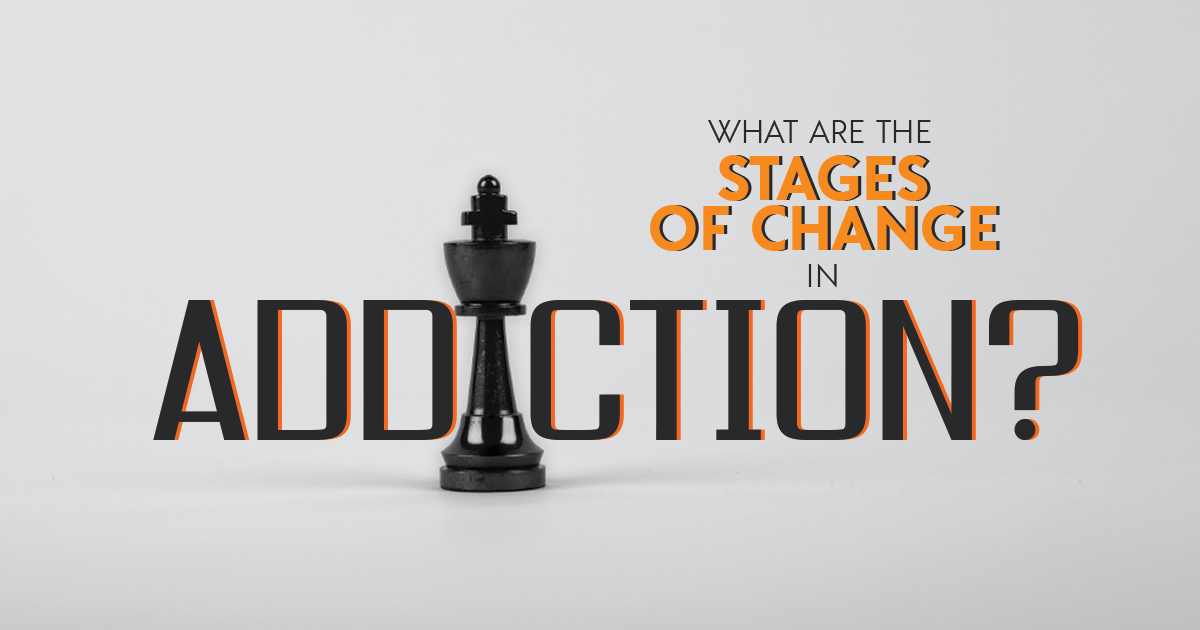When we talk about addiction and, more specifically, addiction recovery, we sometimes refer to the five stages of change. The five stages of change in addiction are a model that describes overcoming addiction and drug abuse.
What Are the Stages of Change in Addiction?
The stages of change apply to other behaviors you might want to change but struggle to do so. These stages are a transtheoretical model in addiction research.
This model is successful in helping treat addiction. The steps in this process are a move away from being confrontational and toward being person-centered and motivational. The stages model is often part of motivational interviewing, for example.
- Sometimes you’ll see this model as being described as having four stages, and other times five.
- The model stems from something developed in the late 1970s by James Prochaska and Carlo DiClemente.
- The five stages of change in addiction assessment are a way to determine how ready you are to go into recovery from active addiction and substance use disorders.
- From there, along with the assessment element, some strategies help guide you into taking action for alcohol or drug addiction.
Along with being useful if you’re struggling with addiction, learning more about the stages of recovery can be helpful for loved ones. These behavioral theories can help you understand the levels of motivation for recovery that someone struggling with addiction may have.
Below, we talk more about each of the stages of change in this particular model of behavior change.
Stage One: Pre-Contemplation Stage
During the pre-contemplative stage, someone in active addiction may not see that there’s a problem at all, or they may be lying to themselves and others about the extent of the negative consequences. If your loved one is in the precontemplation stage, you may try to bring up their drug or alcohol abuse. When you do, they could become defensive or change the subject.
Another scenario during the earlier stages of pre-contemplation is blaming other people or situations for their substance use. For example, they might blame you, other people in their lives, society, genetics, or circumstances.
- There’s a sense of hopelessness in this phase of the stages of addiction recovery.
- Someone in the pre-contemplation stage might not be experiencing the actual adverse consequences of their addiction. That could be one reason they continue to have denial.
- They could also realize there are consequences of their negative behavior and unhealthy behaviors, but they’re in denial about that severity.
- There’s little interest in hearing about giving up drugs or alcohol in the pre-contemplation stage.
- If your loved one is in this stage, you can feel frustrated and angry compared to the other series of stages.
Stage Two: Contemplation
During the middle stages of contemplation, a person with an addiction may start to think about things on a deeper level. A person in the contemplation stage begins to see the consequences of addiction in their daily routine and life. They may spend time thinking about it and the effects of the problem.
- Someone in the contemplation could be open to talking more about their addiction and the results.
- However, they aren’t ready to make a change in this phase to healthy behavior.
- If someone in the contemplative stage were to speak to a treatment professional, they might go over the costs and benefits of getting help. Motivational interviewing techniques could be useful here.
- During contemplation, motivational interview strategies can help someone in active addiction imagine what their life might look like without drugs or alcohol.
Stage Three: Preparation
Once someone reaches the preparation stage, you might feel a little less hopeless about the situation if you’re their loved one. During this period of time, there’s a commitment to changing that someone is often coming around to. We can also refer to this as the pre-action stage.
- During the preparation stage, what someone thought about during contemplation might actually start as they move toward healthier behavior and recovery from addiction.
- Someone in the preparation stage could decide on a specific way they want to change. For example, some people want to stop using drugs or alcohol completely, while others hope to reduce their usage.
- The preparation stage can include determining how to make a change, and at this point, you could begin to get the resources together that you need. For example, if you struggle with opioid addiction, you might start talking to a health care provider about medication-assisted treatment options and similar intervention strategies.
- During the preparation stage, if your loved one is dealing with addiction, it’s an important time for them to begin building a support network.
- For someone who’s thinking about going to a substance abuse treatment center or working with addiction specialists, they may book their stay there during this phase.
Stage Four: Action
The action stage is where you or your loved one could get serious about overcoming addiction and begin behavioral interventions to move toward positive behavior. This is a scary but also exciting time. You are working to make actual changes in your behavior, which is stressful but opens you to many new possibilities.
In many cases, the action stage involves detox and either inpatient or outpatient rehab.
Action can occur all at once or in small stages as part of the treatment process.
If you’re learning to live life without substances, it can feel strange and new and create anxiety. You have to adjust to a different type of life. Coping mechanisms and a strong support system are critical during this stage.
Step Five: Maintenance
The maintenance stage is when you or your loved one continues to work on the progress they started during the action phase. When you’re in the maintenance stage, you’re working on keeping up with the goals and intentions you set in the preparation stage and the behaviors you began during the action stage.
- For many people, the maintenance stage involves staying utterly abstinent from drugs and alcohol paired with healthy activities.
- The maintenance stage can be difficult because you’re past the excitement that comes with initially reaching your goals.
- You can get comfortable in your recovery or overconfident.
- It’s important to stay vigilant during this phase, or the risk of relapse increases.
- During this late stage, your goals are to make sure you continue to use the coping mechanisms you worked on during the action stage and avoid the tendency to fall back into old routines.
- You’re well into your recovery journey drug alcohol or drug dependence at this point.

Is Relapse Part of the Five Steps of Change in Addiction?
In some models, there’s an inclusion of the relapse stage. There’s recognition that someone might have minor lapses or potential relapses during the relapse stage. These are times when you begin addictive behaviors again.
Not everyone will go through this stage of treatment. If your goal wasn’t abstinence but instead was control of your substance use, and you can maintain this objective, you may not experience the relapse stage.
It can be empowering when we understand what motivates us to change as individuals or what motivates those people we care about to change; it can be empowering. You can learn more about what someone is going through and what the recovery process could look like for them.
If you or your loved one is struggling with addiction but feel ready to learn more about taking action, please reach out to the Silver Lining Recovery addiction treatment team by calling 833-844-4769.

